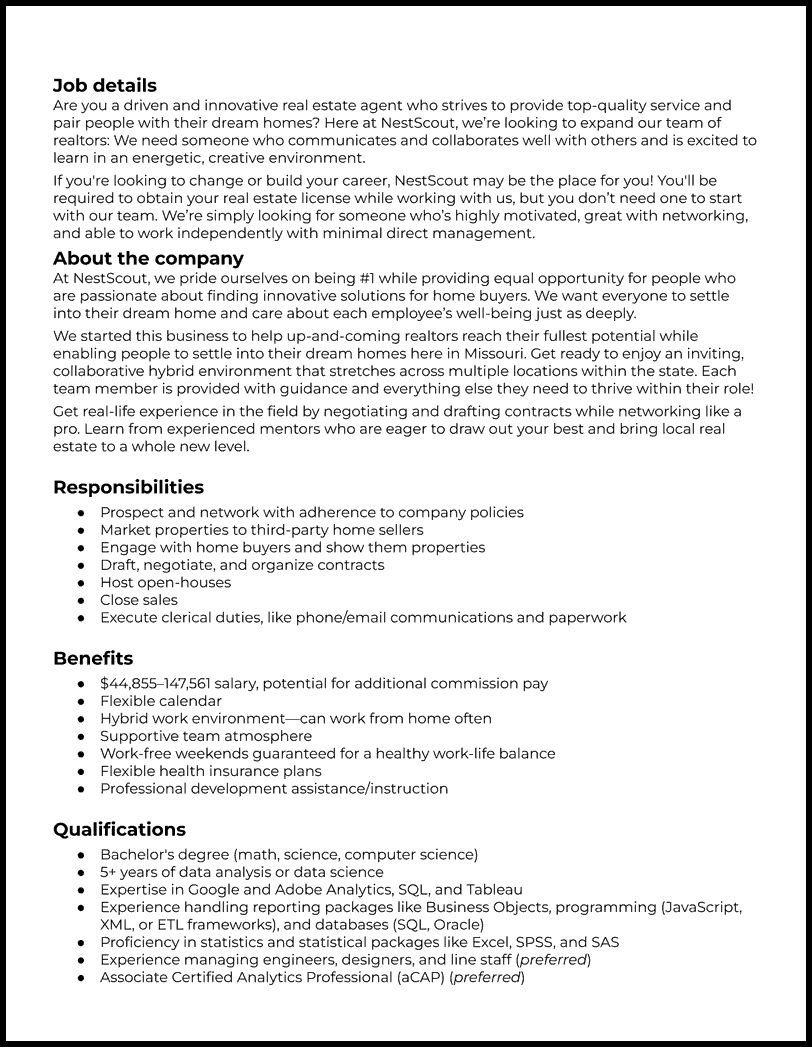Looking to grow your company by hiring a new real estate agent? You’re after someone with that special knack for “home matchmaking,” a real pro at reading people’s unique needs and making each sale a victory for both buyer and seller?
Can they skillfully balance a buyer’s budget against their dream home checklist? How about doing the paperwork and maintaining listings and ads while coordinating with appraisers, inspectors, attorneys, and mortgage lenders?
We know how difficult it is to find that perfect real estate agent resume equipped with the skills to meet all your requirements, no matter how many you read through! So we’ve put together a few realtor job description samples to make sure you attract the perfect hire.
Write a Stellar Real Estate Agent Job Description

So many job descriptions leave applicants yawning—you don’t want your readers to walk away feeling like your job description is generic, and your work environment is just as dull! You want to intrigue readers with a snapshot of your company culture, a clear idea of what types of projects they’d be working on, the team sizes they’ll work with, and so on.
Unfortunately, many job descriptions bombard real estate candidates with qualifications lists that stretch for miles, making them feel like they don’t stand a chance. Or, they’ll provide too little info and then make things worse with unforgivable formatting issues!
The tone of your job description is also important since many other job ads are rife with clunky wording and terrible humor that falls flat. Proofread and ensure you’re accurately representing your company’s personality to get the ultimate real estate agent resumes rolling in.

Figure out who you need on your team and why
While writing your job description, pay special attention to why you’re hiring a real estate agent to begin with. How exactly do you need their help? Does your outdated business model leave employees pulling their hair instead of meeting objectives? Is your networking strategy a total flop?
Keep these motivations in the back of your mind while you write, and focus on listing them strategically:
- Here are some concrete examples of how to write your real estate agent job description in a way that exemplifies the very qualities and values you’re looking for.
- Naturally, you want to hire someone who’s organized and knows how to prioritize tasks—but how is your job description’s organization? Does it flow and reflect what you want?
- Your new realtor will need to fit in with your existing team, so analyze the tone of your job listing: Does it match the overall vibe of the company? Does it accurately portray company values and goals?
- Alongside personability, you want to hire someone with practical skills involving specific programs, market trends, and local regulations. Analyze your company’s current state to emphasize the best possible points in your job description!

Edit and proofread for a well-developed job description
Never underestimate the power of proofreading! Dumping your stream of consciousness onto the page and listing everything you can think of that relates to the job description has its perfect time and place: But that ideal place is in the brainstorming stage, not your final job listing. You’ll want to polish up your job description with a few revisions before posting it for the world to see.
Once you get into a creative flow and jot down whatever comes to mind, imagining some perfect ways to paint an accurate picture of the job, look for ways to consolidate. You want to provide as much information as possible but keep things concise. While it’s tempting to dream big and brain dump everything you could want, remember to specify the minimum requirements for the job!
Begin by Outlining Your Real Estate Agent Job Description

Now that you’ve looked at some examples, here’s a handy outline of how you could break down your real estate agent job description!

Job details
These important specifics tell your readers what your company is like and what they’ll actually be doing if selected as your new real estate agent. This section should be crystal-clear so everyone’s on the same page and no one wastes their time discussing a poor match for the job.
Use simple language to briefly describe your company and its culture with a couple of sentences. Then, outline the real estate agent’s job description with a bulleted list that’s comfortable and easy to read.

About the company
This section allows you to tell a bit more about what it’s like to work with you. Your dream hire could use their real estate expertise to fit in just about anywhere—so what sets your business apart? What makes your work environment unique, interesting, and desirable?
Providing some background information on your company’s history can also give readers some context for your values, enabling them to better gauge their compatibility. No one wants to feel like they’re stuck in a history class, so keep it brief—just add a touch of background information that adds personality and is relevant to today’s company goals.

What you’ll be doing
- Plan/model financial and budget operations management
- Maintain ownership of multiple simultaneous projects, promptly providing support across several teams as needed
- Develop and deliver project presentations

Qualifications
This section falls more within the realm of ideal skills and specializations you don’t have room for in a concise intro that’s meant to hook ideal candidates quickly. You want to give readers the best chance at understanding exactly what they’d be signing up for.
Does a real estate agent need to offer more technical or soft skills for this role? Are there any special programs or local market requirements that you’ll need them to be familiar with? Remember to avoid repetition while listing desired skills, but don’t be afraid to devote plenty of time to developing this section!
- Knowledge of marketing trends and adaptability to relevant changes
- Self-motivated with an ability to work independently and manage your professional advancement
- Basic knowledge of Microsoft Office Suite and leasing software (preferred—you can learn on the job from our existing team of experienced professionals)
- Strong work ethic

Benefits
Every job seeker wants to know all about these! What insurance do you offer, if any? How about paid time off or vacation days? The benefits you provide belong near the end of your job description so that any potential applicants have to at least skim past the Responsibilities and Qualifications sections to get there.
And don’t hesitate to think creatively while filling in this section—does your company offer any supplementary courses or seminars that will help your new real estate agent acclimate and grow? Maybe you even provide on-site access to physical and mental well-being resources! Does your business regularly host paid lunches or birthday parties?
Functions and Roles Inside the Real Estate Agent World

As you know, the world of real estate encompasses many different roles. While any real estate agent you hire should be adaptable and versatile, one person can’t do everything—but these examples should give you some good ideas for things to include in your job description!

Property acquisition specialist
- Any real estate business needs high-quality properties to manage in order to thrive within the market—so you’ll need to hire someone who’s got an eye for acquisition. You can’t let your company develop an association with problematic properties and inferior quality!
- Assess rental or ownership properties for potential acquisition in the context of current market trends
- Research local codes, regulations, and location benefits to determine ultimate property value
- This role will require well-rounded critical thinking, strong communication, plenty of research, efficient time-management abilities, and knowledge of relevant topics that tie in with property maintenance.

Team coordinator
- Since so many different functions go into real estate, especially managerial roles within the field, it’s critical to be able to work smoothly with others, avoid conflicts, and coordinate improvements within the company. Every wheel must point in the same direction to optimize progress, after all!
- Monitor, coordinate, and potentially guide project development teams to optimize each role within the company’s big picture
- Must be willing to communicate well and step in to help as needed
- This role requires high interpersonal skills, which any great real estate agent should strive for anyway! Collaborating and providing insight when others are drawing blanks is invaluable in any group setting.

Problem solver
- In real estate, potential problems seem to be hiding under every rock—sometimes literally, if you discover that a recently-acquired property has some drainage issues, for example! Additionally, sometimes buyers’ regret or stubborn property managers can cause some friction. Your ideal realtor will be able to smooth things over quickly.
- Mediate and resolve complaints for both clients and peers
- Handle difficult situations involving code enforcement, failure to honor leases or other contracts
- Have a knack for finding quick and effective solutions on the spot
- This aspect of real estate involves a deep familiarity with company policies, local regulations in your area of operations, awesome communication skills, and a strong ability to empathize with frustrated individuals.

Negotiator
- Sometimes, the strategies and agreements your company already has in place aren’t necessarily the best: Maybe the market or local culture has changed, rendering past success formulas obsolete. No matter the cause, your real estate agent will need to negotiate.
- Negotiate with suppliers, vendors, and contractors
- Renegotiate lease agreements, payment plans, and property management guidelines
- Negotiation requires a great deal of critical thinking and interpersonal finesse to prevent stepping on any toes while ensuring that all technical needs are met with an optimized approach.

Market analyst
- The terrain of realty is constantly shifting, resulting in a continuous need for agility and research. Your pricing plans and selling points must remain cutting-edge to ensure competitive success within the market. Outdated sales tactics or clunky phrases like “Sorry to bother you, but I would love to have an informative chat” often come off as downright laughable!
- Keep up with current events that may affect property acquisitions and management, as well as pricing changes and other details that will influence buyers
- Staying current requires an eye for detail and a knack for consistently researching with speed and efficiency—not to mention the ability to integrate research results and improve the game plan.

Manager
- If a real estate agent has gotten a few years of experience under their belt, they may feel the need to fill a managerial gap in your work environment. Have your teams been breaking a sweat to meet objectives at the very last minute? Has there been an uptick in communication breakdown?
- Assess, coordinate, and guide project development teams to optimize their roles within the company’s big picture
- Any managerial role features clear communication across the board at its core. A real estate agent manager should be able to oversee multiple teams/departments and ensure cohesion. Additionally, they must be able to provide policy-related guidance and get things done behind the scenes.








